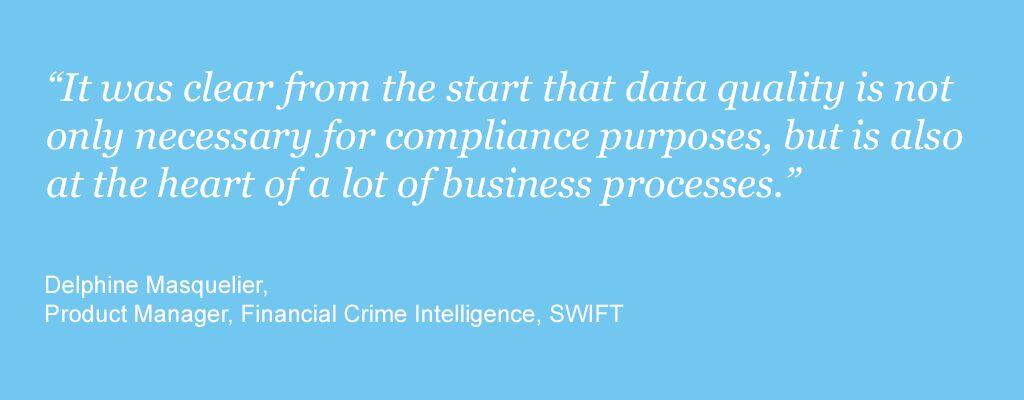Regulators are placing increasing focus on payment transparency and the quality of information included within payment messages
During a panel discussion at Sibos 2017, panellists described how Swift’s Payments Data Quality tool is helping banks assess the quality of data in their payment messages.
The challenges
Delphine Masquelier, Product Manager, Financial Crime Intelligence, Swift explained that banks are increasingly expected to be responsible for the information included within payments. She noted that new guidelines issued by organisations like FATF and the Wolfsberg Group have “brought to light some challenges within the industry.”
Masquelier said that data quality feeds into banks’ transaction monitoring systems and sanctions filters – and that “all these expensive systems are still extremely reliant on the quantity but also the quality of the information going through them.” She added that if information is missing or meaningless, sanctions filters could be considerably less efficient.

Building payments data quality
Masquelier said that these challenges led Swift to create its Payments Data Quality tool in collaboration with the community. The tool gives institutions a global view of the quality of their payments data, based on standard rules.
Institutions can identify issues and areas where improvements are needed. This enables them to assess their compliance with the FATF 16 guidelines and other regulations, and to prioritise and track actions that they take as a result. It also enables users to track their migration towards structured formats.
Masquelier explained that the tool reports on a set of over 35 notifications relating to issues such as repeated characters or too many numbers within an address. Users can turn specific notifications on and off to reduce false positives or bring value to their businesses.
Driving positive change
Matthew Barrett, Head of Central Payment Operations, Investec Bank PLC, said that when Investec began looking at the European Funds Transfer Regulation 2015 (EU FTR 2015), the bank initially opted to “focus on ensuring compliance with the regulation.”
With the bank’s existing sanction screening and payment engine service providers “offering nothing in the monitoring space for this regulation,” Barrett said the bank decided to adopt Swift’s Payments Data Quality tool.
He noted that it was “very easy” to implement the web-based service with Swift’s comprehensive training provision. Barrett also pointed out that the tool provides reassurance that the bank’s payment data quality compiles with the regulation. After finding that adherence to the regulation was “reassuringly high”, the bank looked beyond regulatory compliance and through using the tool were able to identify and deliver several operational improvements.
The bank also identified a few areas of the business that were still involved in manual payment generation and is now taking steps to automate them.
“Now that we’re using the tool on an ongoing basis, it reassures us that our payment data quality will not deteriorate over time,” said Barrett.
The Payments Data Quality tool has been instrumental in driving positive change in our organisation.
Complementing an in-house solution
Ludovic de Mallmann, Co-Head of AML and KYC Group, Société Générale said that Société Générale processes 3.3 million transactions per day – “so looking at data quality is a massive challenge”. As well as FATF Recommendation 16, he explained that the bank also had to comply with EU regulations requiring that payment service providers in the European Economic Area to include precise payer and payee information.
De Mallmann said that the bank had already begun working on an in-house solution. As such, “Payments Data Quality came as a very complementary and helpful solution for us.” The bank adopted Payments Data Quality as a back-up solution and identified a number of issues relating to missing data and unstructured data. The bank also used Payments Data Quality as a sandbox for gauging the impact of specific changes.
Following the successful launch of the in-house project, the bank will continue to use Payments Data Quality as a benchmark and backup solution. It will also continue to be used as a sandbox as the bank works to meet additional guidelines published by the European Banking Association.
With Payments Data Quality, you don’t have to plug into your IT systems and talk to hundreds of IT people – you just have an online service which gives you access directly to the data.
Payments Data Quality
Swift’s Payments Data Quality service checks the quality of originator and beneficiary data for both incoming and outgoing payment messages, thereby supporting compliance with FATF Recommendation 16 and related regulation. The service also enables banks to improve the data quality in their payments messages, resulting in greater operational efficiency and more effective transaction screening.


